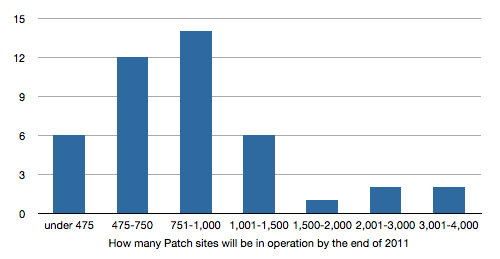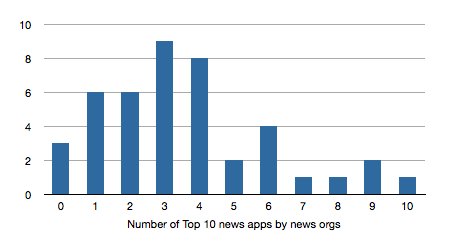 In case you haven’t noticed, we’ve been writing a lot about what a variety of smart people think 2011 will bring to the world of journalism. Will paywall go up everywhere or come tumbling down? Will hyperlocal thrive? Will nonprofits run out of donors?
In case you haven’t noticed, we’ve been writing a lot about what a variety of smart people think 2011 will bring to the world of journalism. Will paywall go up everywhere or come tumbling down? Will hyperlocal thrive? Will nonprofits run out of donors?
But beyond the predictions of the noted and notable, we wanted to ask you, the Lab reader, what you thought was coming. We did so in the form of a 25-question survey, and here are the results.
Important note: This survey is wildly unscientific. Fifty people completed it, and not everyone answered every question. Talk with your physician before using any of these isolated data points to wager any money or make decisions of even the slightest import. The intention here was to get a broad idea of what our readers are thinking, and maybe to be entertaining. Capice?
Here are the questions and what the survey said, Richard Dawson-style:
Two of the biggest online-only brands stood above the crowd: The Huffington Post (27 percent) and Gawker Media (15 percent). The Daily Beast, Mashable, and Patch also got more than one vote. Among those getting single mentions: Flipboard, Inside Higher Ed, StockTwits, and The Batavian.
As might be expected, ProPublica led the way with 24 percent of votes. Talking Points Memo, Politico, The Texas Tribune, Slate, The Daily Beast, and Patch also got multiple votes. (Politico’s nature as online-dominant in audience, print-dominant in revenue makes it a tough news org to squeeze in the online-only category.)
Getting single mentions, among others, were Left Coast nonprofits Bay Citizen, Voice of San Diego, and California Watch, plus for-profits GlobalPost, TBD, and GigaOM.
One wag suggested “Clay Rosen,” squeezing the two top vote-getters into one: Clay Shirky (20 percent of votes) and Jay Rosen (11 percent). Jon Stewart, Ken Doctor, and Mark Cuban got multiple votes each. Getting single mentions: Julian Assange, Steve Jobs, Tim Wu, Tim O’Reilly, and Jonathan Zittrain, among others.
John Paton‘s efforts to turn around the moribund Journal Register Co. have gotten noticed: he led the way with 14 percent of votes, far outpacing The Guardian’s Alan Rusbridger and CUNY’s Jeff Jarvis. (Personally, I would have put Jeff in the Clay/Jay outsider category, but he wears enough hats that he could probably fit anywhere.) Others getting mentions: WaPo/TBD-ex Jim Brady, New York’s Adam Moss, Talking Points Memo’s Josh Marshall, Gawker’s Nick Denton, and Rupert Murdoch.
These ran the gamut. Among the most interesting:
— A major U.S. city will lose its one remaining major metro daily.
— Newspapers will be caught with their pants down for mobile usage in 2011, with website usage dropping and moving to mobile competitors.
— The beginning of more widespread paywalls, which will work for some but fail for most.
— Mobile traffic — especially tablets — rises by 30 percent.
— Partisans will attack mainstream media outlets for percieved bias. Websites will be hit. Bastions of populism will be humbled.
— Revenue from e-content (online, iPad, Kindle, smartphones, etc.) will exceed revenue from traditional sources.
— Stories will tend to focus on continued congressional bickering, while ignoring the stagnating economy and reputation of the U.S. in times of dramatic shifts in global power structures for the budding generations of tech natives.
— The Awl will be acquired.
— Twitter will launch a branded international news aggregation service, similar to the AP, but focused on real-time online content. It will be staffed with former newspaper journalists.
Optimism (of a sort) abides: The top answer was “none,” with 32 percent of responses. None of the answers got much momentum, though Newsweek, The San Francisco Chronicle, USA Today, The Detroit News, and Forbes each got two or more mentions.
Voting was close: 47 percent think the paywall will be judged a success; 53 percent think it’ll fall short of expectations. Whatever those are.
The most popular answer was three newspapers. Given that The Wall Street Journal is already bepaywalled, and the Times is set to join that number in a few weeks, the popularity of three suggests most surveyed don’t think the paywall momentum will spread too far beyond that. (Here’s the current list of the countries biggest papers.)

A really scattershot response to a pretty scattershot question. Maureen Dowd got three votes, Ezra Klein and David Carr two each. Among the more unexpection mentions: Malcolm Gladwell, Ira Glass, and Dexter Filkins. (Maybe someone thinks The New Yorker is primarily an online operation.)
Most folks believe Patch will still be under 1,000 by next year’s end. (I’m not so sure.)

Old media wins — barely: 57 percent say the NYT, 43 percent HuffPo.
These numbers don’t shake out like the primetime ratings do: 41 percent say CNN, 37 percent say Fox, and 22 percent say MSNBC.
The Washington Post wins out, 80 percent to 20 percent.
Perhaps a trick question, depending on how NewsBeast finally decides to handle its URLs. But 83 percent think the Beast half will win out.
Another close call: 56 percent say Google, 44 percent Facebook.
Our survey takers weren’t Rupert optimists: 36 percent say it’ll be a success, with 64 percent saying no.
The answers were a random spray: no two predictions matched up. Some of the more intriguing: AOL and Yahoo, Tribune and Yahoo, US Weekly and The Huffington Post, Slate and The Atlantic, TBD and the Washington City Paper, Clear Channel and Pandora, Politico and Roll Call, and Gannett and Groupon. (Although if Groupon can turn down Google’s money, I can’t imagine them hitching themselves to a newspaper wagon.)
Messrs. Sulzberger, Keller, and Slim (among others) should be happy with the results: The New York Times was the runaway winner, garnering 44 percent of all votes cast. Tying for a distant second (at 9 percent) were The Guardian and The Wall Street Journal. Others getting votes: ESPN, NPR, and Reuters.
82 percent of survey-takers said yes, mobile would make up a tenth of total web traffic in 2011. Current estimates vary, but these suggest the current number’s around four percent.
Average answer: 11.8 million. Median answer: 10 million. Mode: also 10 million. One pessimist suggested 4 million, portending great doom for the Twitter platform; the biggest twoptimist (ugh) guessed 25 million.
Again, optimism reigns: 40 percent of respondents said no significant outlets will close in 2011. Salon and Slate led the way among those who thing one will.
They passed 500 million this year. 56 percent of survey takers say they’ll hit a billion in 2011.
The aggregators will continue to take slots away from news orgs, survey says: 74 percent of respondents said they expected news orgs to publish less than half of the top 10 apps.

The most common prediction (48 percent) was for continued but unspectacular growth in 2011, to somewhere between 4 and 6 million. An optimistic 17 percent said Foursquare will surpass 10 million active users; a pessimistic 7 percent said it’ll drop below its current user base.
57 percent of survey-takers predict Android beating out Apple’s mobile products. This is another area with lots of warring numbers, but these numbers suggest Android still has some catching up to do — especially if the iPhone heads to Verizon in the U.S. in 2011.